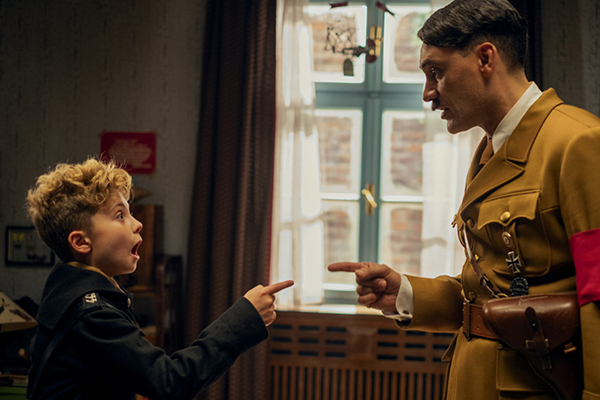“Jojo Rabbit” is a WWII dramedy from director Taika Waititi that focuses on a young boy who idolizes Hilter and his reaction to finding out his mother has been hiding a young Jewish girl in their walls.
While dealing with a heavy subject matter, the film expertly navigates the rocky terrain with well-placed jokes among properly handled dramatic scenes. This is not a film that humanizes Hitler or Nazis — it is a story about false idolization and the catastrophic aftermath of when someone unqualified is in a place of power.
A film of this subject material would not be able to succeed without an extremely strong main and supporting cast. Roman Griffin Davis absolutely carries the film with his strong and naive performance as Jojo Betzler. Davis conveys the innocence and blind faith of 10-year-olds and is able to hit emotional notes with powerful facial reactions to revelations regarding his support of Nazi Germany. His innocence combined with his skewed world view makes for a very interesting and uncomfortably unsettling protagonist.
Scarlett Johansson is the heart of the film with her hopeful portrayal as Jojo’s mom. Her undying love and positive outlook shines as she represents a beacon of hope among war-torn Germany. Her scenes with Davis are extremely touching and, at times, tear-inducing.
The biggest surprise of the film comes from Thomasin McKenzie’s portrayal as Elsa. While mostly kept out of the marketing material for the film, McKenzie’s portrayal of a Jewish girl hiding from the Gestapo is heartfelt and emotionally powerful. She’s witty and intelligent, often poking fun at the absurdity of Jojo’s Nazi fascination. McKenzie’s character is one of the most enlightening in the film, offering the only major perspective of Jewish people during those times.
The brilliance of the film comes from director Taika Waititi’s ability to balance comedy and heart with the heavy subject material of the film. Waititi knows when things need to be taken seriously, and he uses comedy to exploit the idiocy of the Nazis as opposed to glorifying them. He depicts Hitler as a pompous, overconfident and unintelligent child to coincide with Jojo’s innocence. As Jojo grows closer to Elsa and witnesses the horrific acts of the Gestapo, he starts to struggle with comprehending the Nazi ideology, resulting in a powerful realization about morality and identity.
The editing style and musical selection helps to fully bring the world of “Jojo Rabbit” to life. Beautiful slow-motion sequences paired with an angelic score strike an emotional cord. Joyful tracks follow Jojo as he navigates his town, oblivious to the evil lurking all around him. Dancing is a common motif throughout the film, emphasizing the idea of enjoying the little pleasures in life despite the raging war effort dominating the world.
“Jojo Rabbit” is miraculously able to convey an emotional, comedic, terrifying and heartfelt tone all at once, making for what may arguably be one of this year’s greatest films.




















